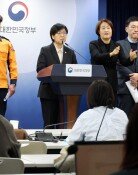Korea, Japan leaders advised to meet at G20 summit
Korea, Japan leaders advised to meet at G20 summit
Posted August. 21, 2013 07:33,
The Japanese government proposed to Korea through Korean Ambassador to Japan Lee Byeong-gi that the two countries hold a summit meeting during the G20 summit set to take place in St. Petersburg, Russia from September 5 to 6. The leaders of the two neighboring countries last met in December 2011, or 20 months ago. Since then President Lee Myung-baks visit to Dokdo islets in August last year, bilateral ties have effectively remained severed, save exchange in the private sector.
Watchers have conflicting views on the need for a Korea-Japan summit. Those who support a summit cite as reasons that there will be little possibility for a shift of situation if the two sides are to take resolution of past history dispute as premise for their summit, that past history needs to be handled separately from other issues, and that the two countries need to closely cooperate on many different matters. Issues for cooperation include North Koreas nuclear program, countering of fast emerging China, and economic affairs. Some experts say that Korea needs Japans cooperation for the Korean Peninsula trust-building process and a plan on peace and cooperation in Northeast Asia, agendas that President Park Geun-hye advocates for. Those who deny the need for a summit meeting argue that Korea has no reason to join hands with Japan, which lost its allies in the Northeast Asia region and desperately needs a partner, and that if Japan denies past history and claims its sovereignty over Dokdo again in their summit, Korea will embrace serious ramifications.
But it is believed that rejecting an offer to hold a semi-official summit on the sidelines of a multilateral summit, as opposed to bilateral talks, is not a tactic that is necessarily beneficial to Korea. It would be quite another matter if Korea will never hold summit talks with Japan, as long as Tokyo does not make remarks on past history, Dokdo and comfort woman for the Japanese military, which are acceptable to Korea. If this is not the situation, Korea had better to accept the offer for a summit by reducing its expectations for the summit, thus create momentum to improve bilateral ties, and secure a dialogue channel. Korea also needs to consider the possibility that Japanese Prime Minister Shinzo Abe will remain in power over the next three years.
Of course, the Japanese government should take a bold stance in its effort to create an environment for summit talks. Abe angered Korea by commenting, The definition of aggression is not clear. He did not pay a visit to the Yasukuni Shrine, but earned criticism from both in and outside of his country at a memorial ceremony honoring fallen Japanese soldiers on August 15, because he failed to admit to Japans aggressions into neighboring countries, reflect upon accordingly, and make resolution not to engage in war. If Japan truly wants a Korea-Japan summit, the island country should make explanations on the move and prevent recurrence. Preparatory work can be done through working-level consultative talks. If Park and Abe come to frown at their first encounter, Japan should recognize that practical summit talks between the two countries will not take place for a considerable period of time.







